Key takeaways
- Fear in queer women culture is often tied to societal rejection and can serve as both a protective shield and a barrier to connection.
- Brené Brown emphasizes vulnerability as a strength, encouraging individuals to embrace their fears and approach them with empathy and self-compassion.
- Building resilience in queer communities involves sharing personal stories and fostering connections, which can transform fear into collective courage.
- Everyday acts of courage, such as speaking one’s truth and setting boundaries, are essential to overcoming fear and promoting authenticity.
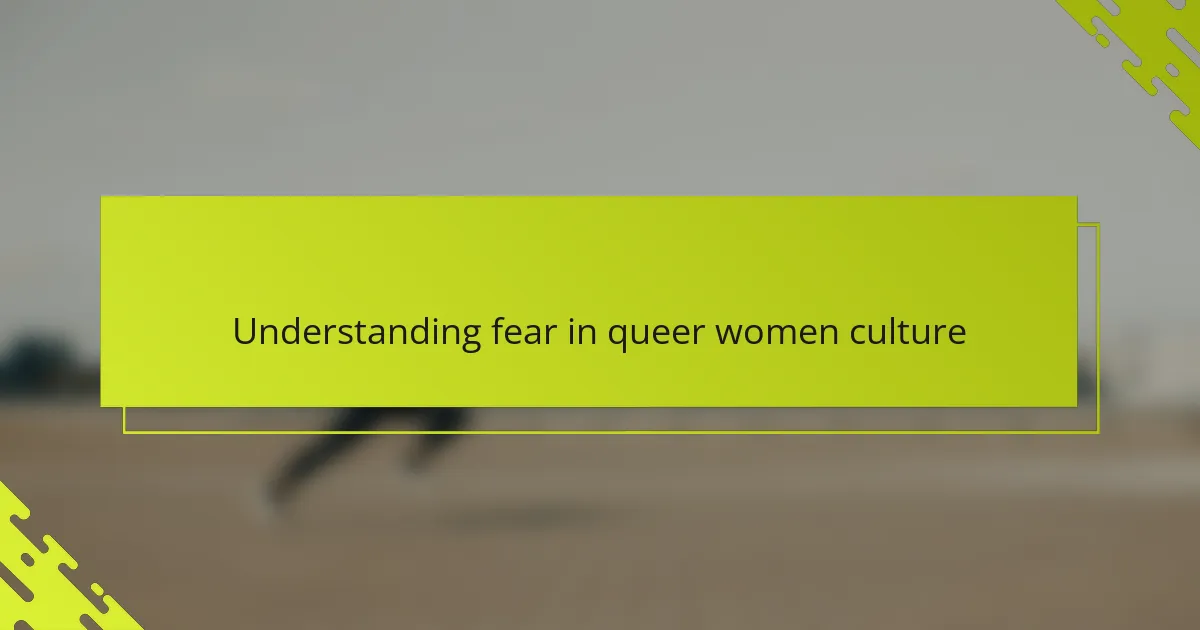
Understanding fear in queer women culture
Fear in queer women culture often runs deeper than the immediate threat; it’s tied to layers of societal rejection and the invisible pressure to constantly prove one’s identity. I’ve felt that knot in my stomach—the fear that speaking my truth might lead to isolation or misunderstanding. Have you ever hesitated to share a part of yourself because you weren’t sure how it would be received?
This fear is not just personal but collective, shaped by histories of marginalization and the ongoing struggle for acceptance. It’s emotional and exhausting, like carrying a weight that others might never notice but always feels present. I’ve come to realize that recognizing this shared fear is the first step toward breaking its hold.
Isn’t it striking how fear can simultaneously protect and paralyze us? Within queer women culture, fear acts as both a shield and a barrier, making us more cautious but also limiting opportunities for connection and growth. Understanding this complex role of fear has been essential for me in learning how to move beyond it.
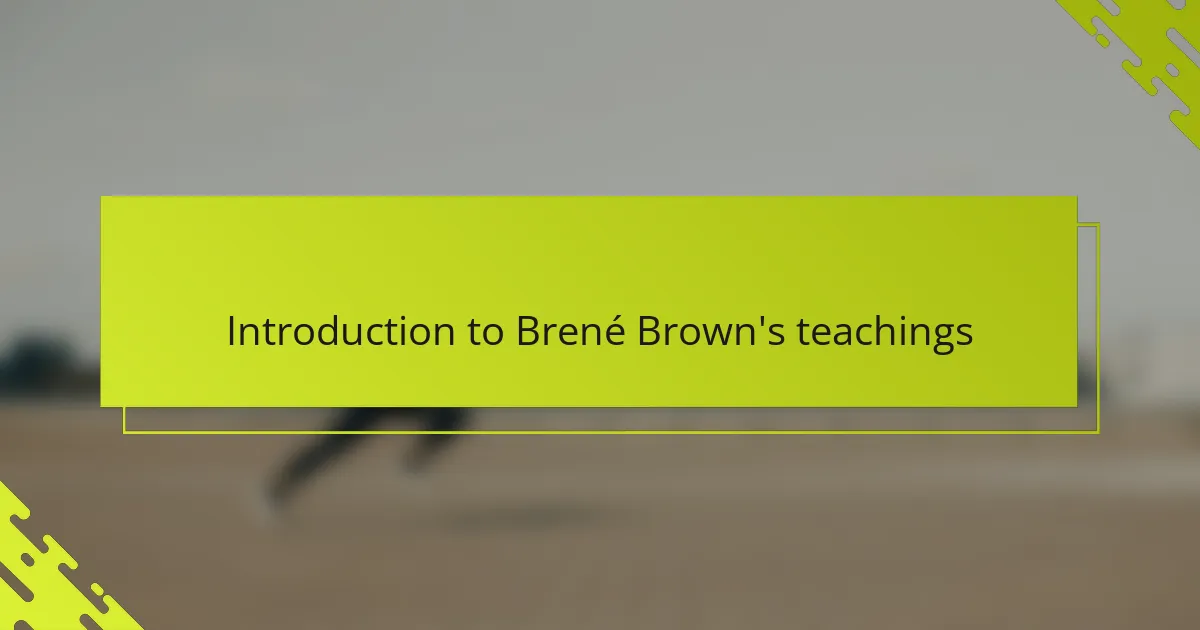
Introduction to Brené Brown’s teachings
Brené Brown’s teachings have truly shifted how I view fear and vulnerability. She often talks about embracing vulnerability—not as a weakness, but as the birthplace of courage and connection. Have you noticed how much easier it is to relate to someone when they’re open about their struggles?
One idea that stuck with me is Brown’s concept of “wholehearted living,” which means showing up with all of yourself, even when it’s scary. That felt revolutionary, especially because fear had kept me hiding parts of who I am for so long. It made me wonder: what if I stopped running from fear and started leaning into it instead?
Brown also highlights the importance of empathy and self-compassion. I realized that fighting fear alone only isolates me more, but when I offer myself kindness and reach out to others, that weight lightens. Have you ever tried treating your fear like a friend instead of an enemy? For me, it’s been a game-changer.
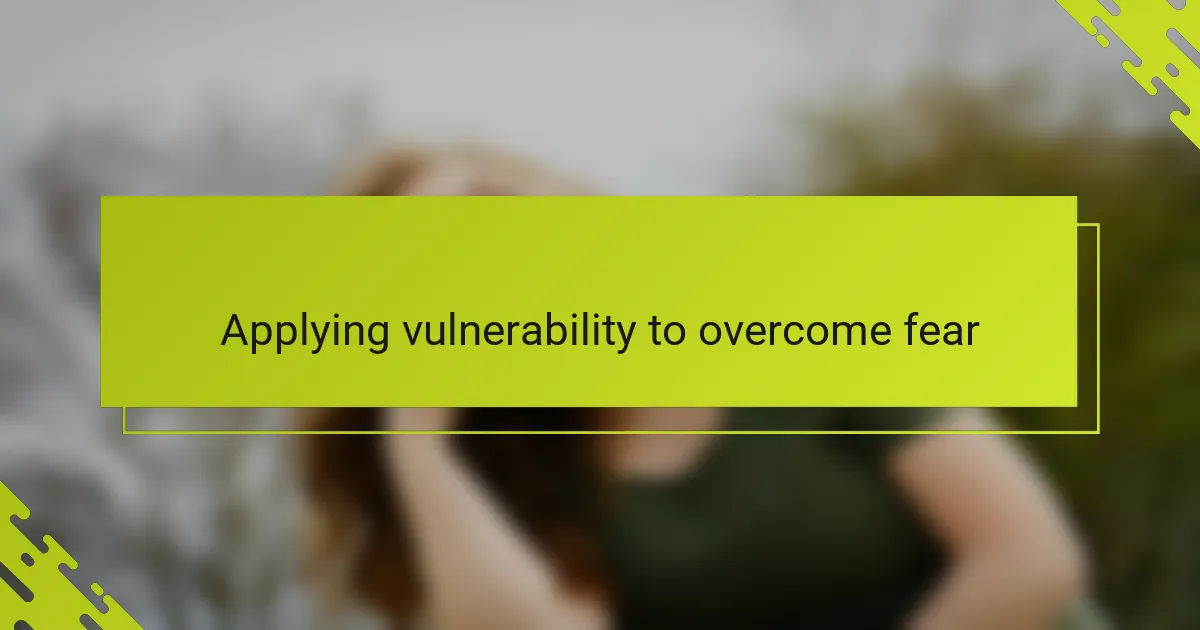
Applying vulnerability to overcome fear
When I first started applying vulnerability as Brené Brown teaches, it felt like stepping off a cliff without knowing if I’d fly or fall. But each time I dared to share a part of my story—whether it was about my fears or my identity—I noticed something powerful: fear lost some of its grip. Have you ever felt that moment when speaking your truth suddenly makes the world feel a little less heavy?
Vulnerability, in my experience, isn’t about being exposed or weak; it’s about choosing courage over comfort. I remember a time when I was terrified to attend a community event alone, afraid of judgment and rejection. But when I showed up anyway, authentically and with an open heart, I found unexpected allies and moments of connection that healed parts of my fear I hadn’t known were wounded.
It’s strange how embracing vulnerability flips fear on its head. Instead of shrinking away, I’ve learned to lean into those uncomfortable feelings, knowing they’re invitations to growth. Have you noticed how fear starts to lose its sharp edge when you meet it with honesty and self-compassion? That’s been one of the most freeing lessons Brené Brown helped me embrace.
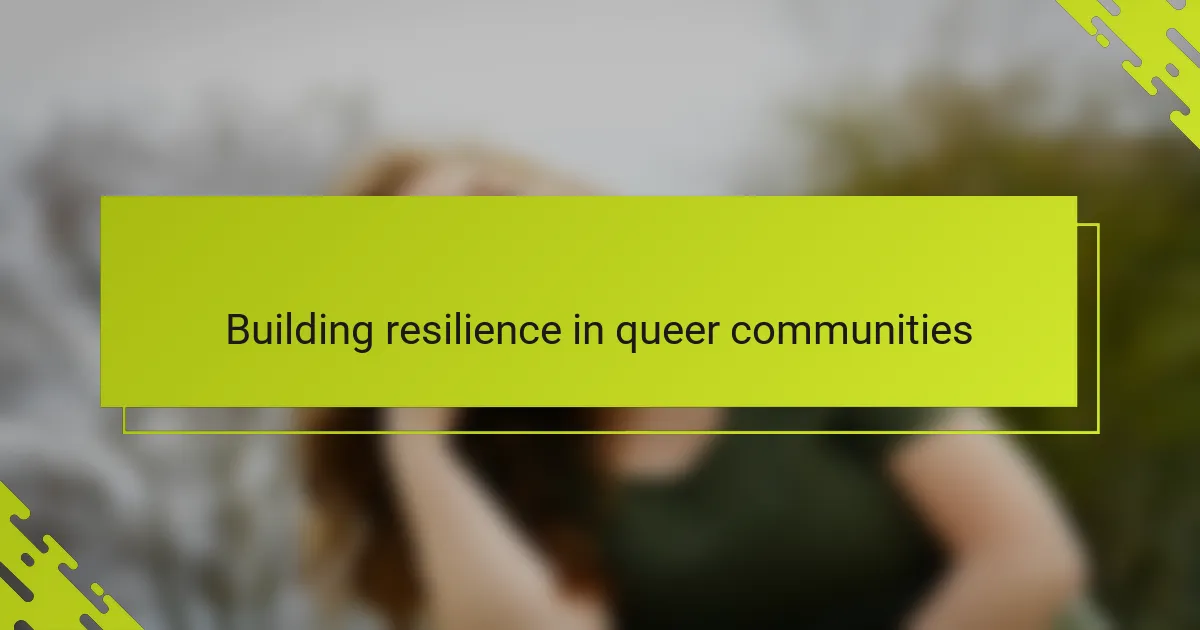
Building resilience in queer communities
Building resilience in queer communities means creating spaces where authenticity is not only accepted but celebrated. I’ve seen how small acts of sharing personal stories can weave a fabric of support that makes fear less isolating. Have you experienced the relief that comes when someone listens without judgment, simply holding that vulnerable truth?
Resilience grows when we acknowledge the collective strength born from our shared struggles. I remember attending a queer women’s gathering where the air was thick with both past pains and hopeful defiance—it was in that room that I felt fear dissolve into fierce solidarity. Isn’t it remarkable how connection can transform trembling uncertainty into bold, persistent courage?
Sometimes, resilience means leaning into discomfort together, knowing that healing is a communal journey. When I reached out to others during moments of doubt, their empathy reminded me that I am not alone in this fight. What if more of us embraced this interconnectedness as our strongest form of resistance?
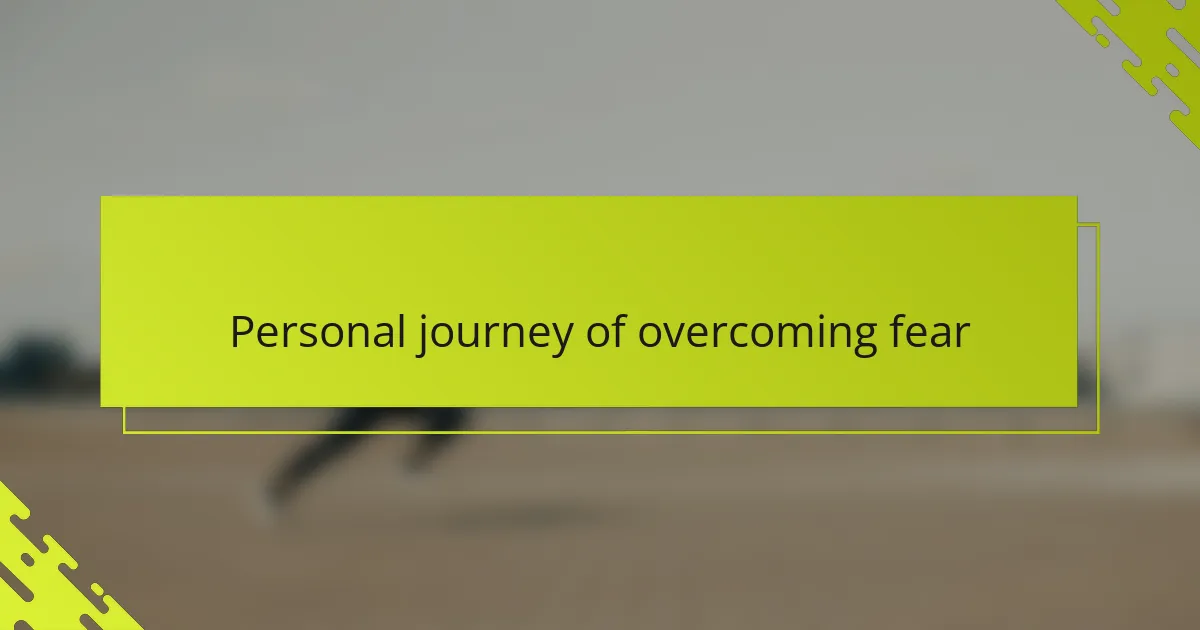
Personal journey of overcoming fear
Fear used to feel like a constant shadow in my life, especially within queer spaces where acceptance sometimes felt conditional. I remember nights lying awake, my mind racing with “what ifs” — what if I’m rejected, what if I’m misunderstood? Those moments were raw and isolating, but I slowly realized that facing those fears head-on was the only way to reclaim my power.
There was a turning point when I consciously invited fear to the conversation instead of running from it. I told myself, “What if fear isn’t my enemy but a signal that I’m about to grow?” This shift didn’t happen overnight, but each small step—like speaking up in a group or sharing my story—felt like peeling back a layer of armor, revealing more of who I truly am.
Have you ever noticed how personal fears, when named and met with kindness, start to lose their grip? For me, embracing fear with the gentle curiosity Brené Brown champions transformed it from a paralyzing force into a signpost pointing toward courage. It’s still there sometimes, but now it feels more like a companion than a captor.
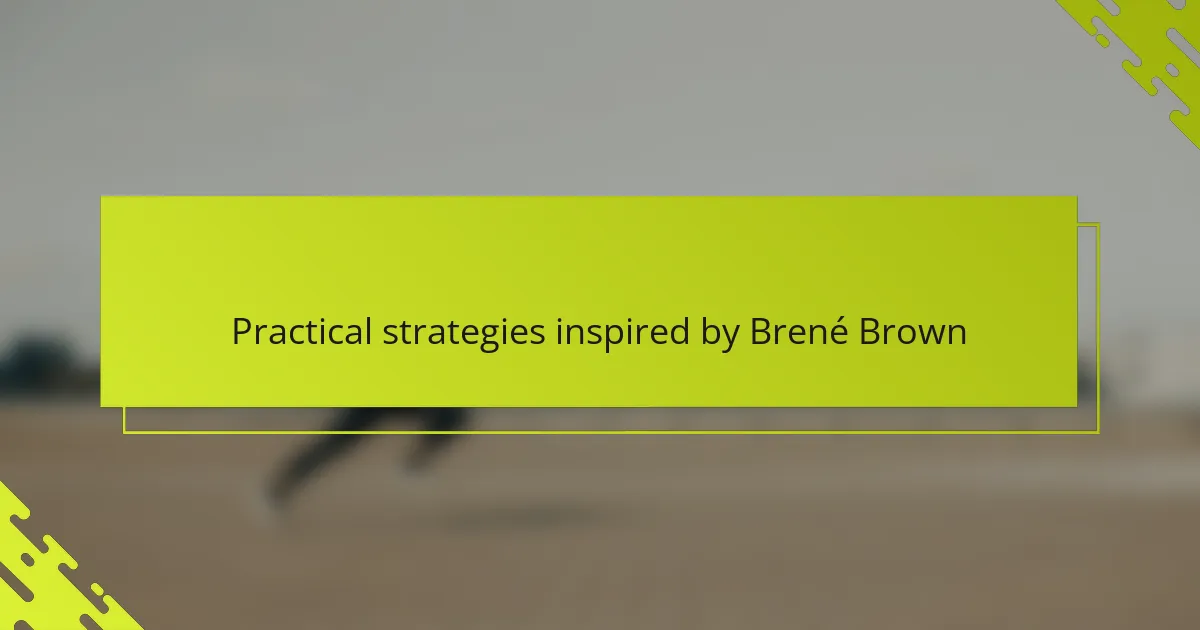
Practical strategies inspired by Brené Brown
One practical strategy Brené Brown inspired me to try is what she calls “rumbling with vulnerability.” It sounds intense, right? But really, it means sitting with the uncomfortable feelings instead of running away—asking myself what I’m afraid of and why. I remember journaling through a tough moment, and once I named the fear, it suddenly felt less like a shadow looming over me and more like a puzzle I could solve.
Another approach that resonated deeply was practicing self-compassion. Brown emphasizes treating yourself like a close friend when fear shows up, rather than beating yourself up. I tried this after a difficult conversation about my identity; instead of criticizing myself for feeling anxious, I gave myself permission to feel scared and celebrated the courage it took to speak up. Have you noticed how kindness softens fear’s harsh edges?
Lastly, Brené’s focus on connection changed how I navigate fear within my community. She encourages leaning into empathy—both giving and receiving it—as a way to dismantle isolation. At a queer women’s meetup, I shared a vulnerable story and was met with warmth and understanding that made me realize fear thrives in silence but withers in shared stories. Isn’t it amazing how opening up can turn fear into a bridge rather than a wall?
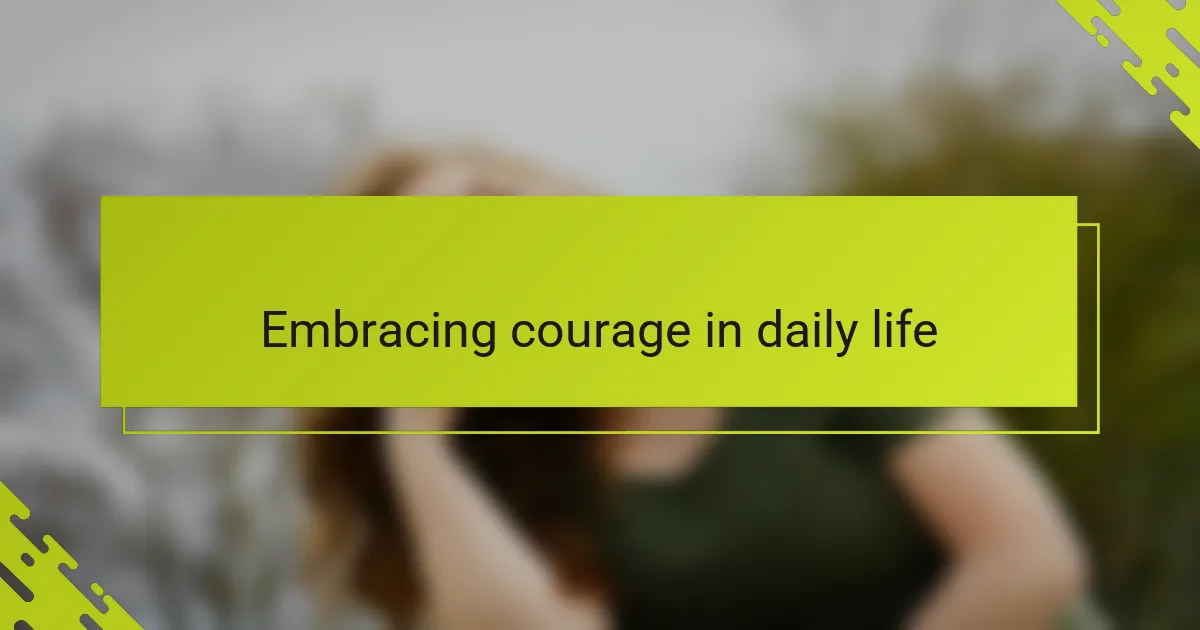
Embracing courage in daily life
Courage doesn’t always come as a roaring blaze; sometimes, it’s a quiet choice to face the day despite the lingering shadows of fear. I find that embracing courage daily means showing up fully, even when my heart whispers doubts. Have you ever noticed how the simple act of deciding to keep going—one breath, one step—can feel like a small but profound victory?
In my own experience, courage builds gradually through little moments: speaking my truth in a meeting, setting boundaries with kindness, or simply allowing myself to be imperfect. It’s these everyday acts that Brené Brown’s work helped me see as powerful forms of bravery. What if courage isn’t about heroic feats, but about consistently choosing authenticity in the face of uncertainty?
Sometimes, embracing courage feels like choosing vulnerability on repeat, trusting that each act of openness chips away at fear’s hold. I remember the tremble before telling a close friend about my identity, and how that moment of courage opened the door to deeper connection. Isn’t it striking how courage in daily life becomes a practice of saying yes to ourselves again and again?
